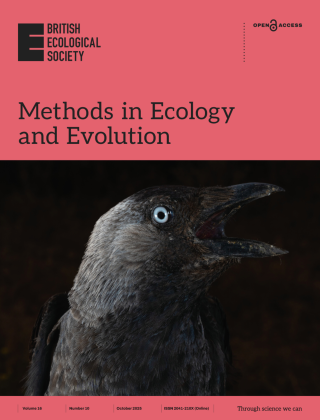-
Oct 2025 • Journal Article • Methods in Ecology and Evolution
An active ensemble classifier for detecting animal sequences from global camera trap data
AbstractCamera traps can generate huge amounts of images, and thus reliable methods for their automated processing are in high demand: in particular to find those images or image sequences that actually include animals. Automatically filtering out images that are empty or contain humans can be challenging, as images can be taken in different landscapes, habitats and light
… show more -
Mar 2025 • Journal Article • Ecohydrology
How Perennials Survive the Droughts—Pulse–Reserve Dynamics in a Hyperarid Basin
AbstractThe hyperarid environment poses significant challenges to local vegetation. The main limiting factors are water scarcity and inconsistent precipitation regimes. Nevertheless, perennials flourish in hyperarid stream channels, predominantly acacia trees, which require significant amounts of water. This study seeks to reveal the mechanism that provides acacias with adequate
… show more -
Feb 2025 • Journal Article • Open Journal of Ecology
Estimation of Aboveground Biomass of Acacia Trees in the Hyper-Arid Arava, Israel Using Allometric Analysis—Allometric Equations for Acacia Trees in the Desert
AbstractBiomass is among the most important state variables used to characterize ecosystems. Estimation of tree biomass involves the development of species-specific “allometric equations” that describe the relationship between tree biomass and tree diameter and/or height. While many allometric equations were developed for northern hemisphere and tropical species, rarely have
… show more -
21 Sep 2023 • Journal Article • Journal of Insect Conservation
Can microhabitat preferences of ground-dwelling insects be a good indicator for terrestrial ecosystem recovery after an oil spill?
AbstractDespite the significant global impact of oil spills on the environment, little is known about the effects of oil spills on animals in terrestrial ecosystems, particularly in desert environments. In contaminated areas, habitat selection can be a crucial behavior determining individuals survival as well as a potential indicator of an ecosystem’s condition. This is especially
… show more -
Jun 2023 • Journal Article • Ecosphere
Toward an extreme world: The hyper-arid ecosystem as a natural model
AbstractThe forecasted increased frequency and intensity of extreme climatic events may strongly affect ecosystem structure and function in the future. It is unclear how ecosystems will function in the long run over a large spatial scale under a new extreme water cycle. This open question calls for a conceptual framework as a fundamental basis for theoretical and experimental
… show more -
1 May 2023 • Journal Article • Urban Climate
Do urban tree hydraulics limit their transpirational cooling? A comparison between temperate and hot arid climates
AbstractEvaporative cooling due to transpiration of urban trees in two contrasting climates is the subject of this study. Transpiration was studied experimentally on local tree species at ‘tree lab’ sites in Munich, Germany (temperate climate) and in Beer Sheva, Israel (hot arid climate), within various settings (park, street, square) with natural and sealed surface conditions
… show more -
14 Jul 2021 • Journal Article • Frontiers in Forests and Global Change
Effects of climate and atmospheric nitrogen deposition on early to mid-term stage litter decomposition across biomes
AbstractLitter decomposition is a key process for carbon and nutrient cycling in terrestrial ecosystems and is mainly controlled by environmental conditions, substrate quantity and quality as well as microbial community abundance and composition. In particular, the effects of climate and atmospheric nitrogen (N) deposition on litter decomposition and its temporal dynamics are
… show more -
5 Jul 2021 • Journal Article • Applied Sciences
Asynchrony Drives Plant and Animal Community Stability in Mediterranean Coastal Dunes
AbstractSubstantial evidence now suggests that a positive diversity–stability relationship exists. Yet few studies examine the facets of biodiversity that contribute to this relationship, and empirical research is predominantly conducted on grassland communities under controlled conditions. We investigate the roles of species richness, environmental condition (vegetation cover)
… show more -
Jul 2021 • Journal Article • Journal of Insect Science
The Impact of Roads on the Redistribution of Plants and Associated Arthropods in a Hyper-Arid Ecosystem
AbstractThe construction of vehicular roads likely affects the distribution of natural resources. Although the effects of roads on different ecosystem aspects have been extensively studied, studies in arid and, particularly, in hyper-arid ecosystems are scarce. In drylands, where water is the main limiting factor, the effect of roads on the redistribution of water may have
… show more -
Jun 2021 • Journal Article • Journal of Arid Land
An arthropod community beyond the dry limit of plant life
AbstractWater availability, which enables plant growth and animal activity, regulates dryland ecosystem function. In hyper-arid ecosystems, rain cannot support vascular plant growth. Therefore, hyper-arid vegetation is restricted to the lower topography, where runoff accumulates. Typically, food resources originating from areas of dense vegetation are dispersed across the desert
… show more















